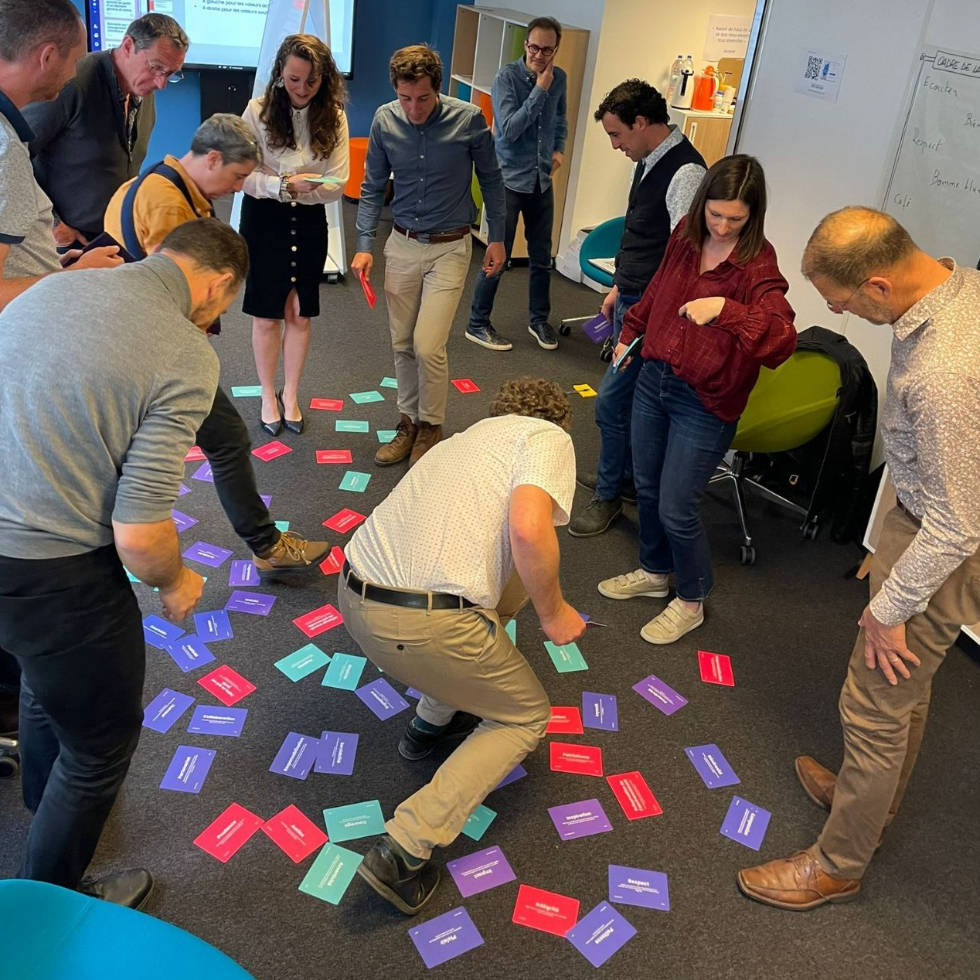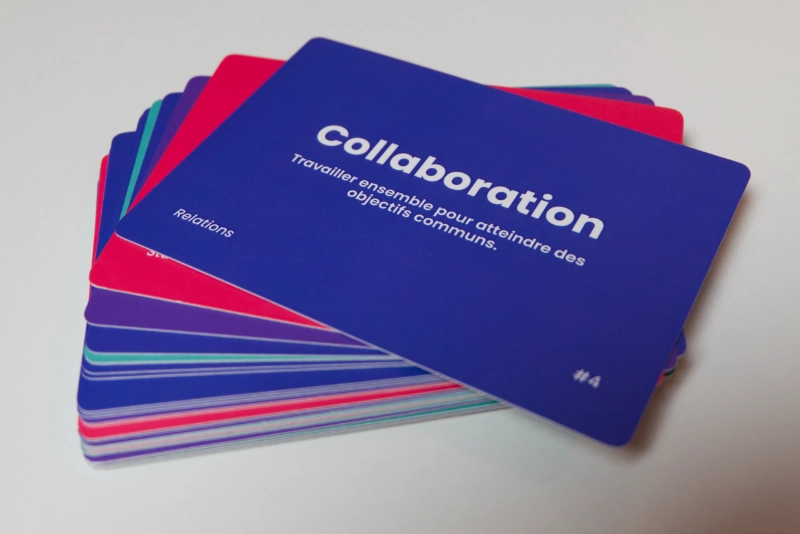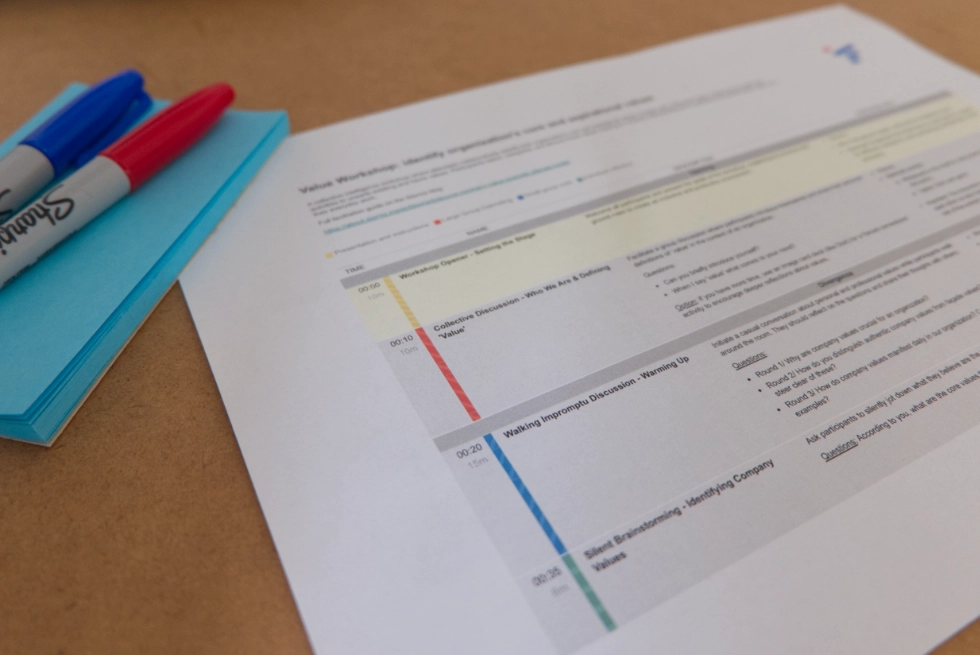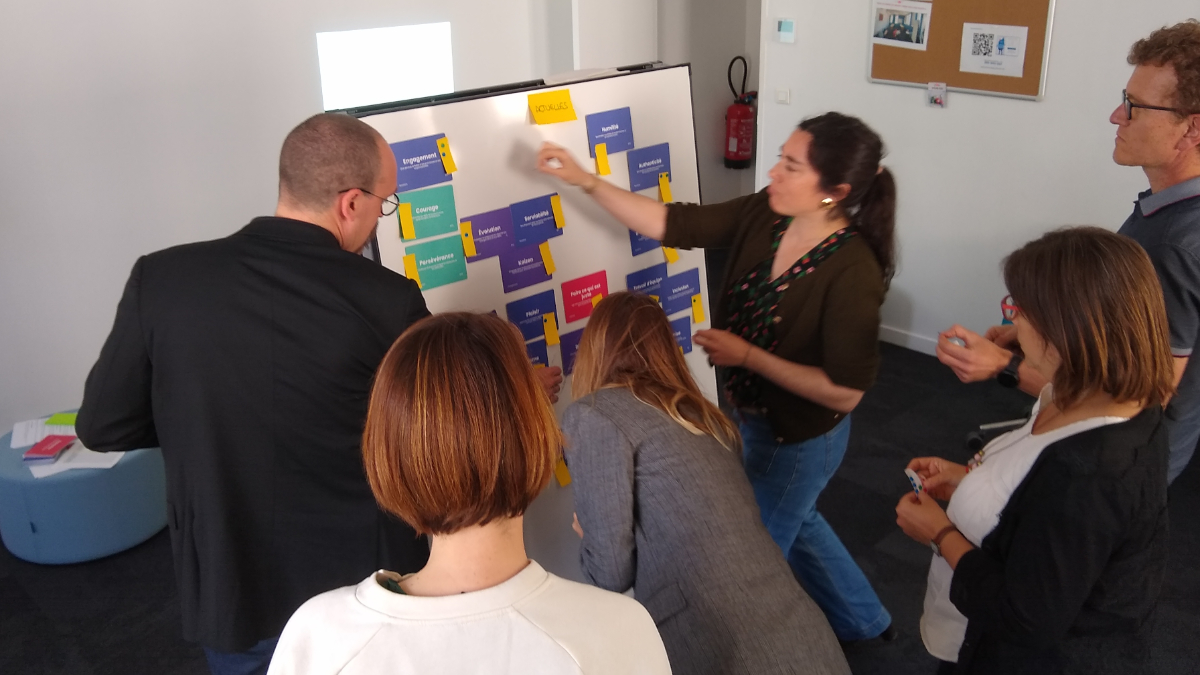Core company values are the backbone of any successful organization. They shape the culture, guide decision-making, and play an instrumental role in employee engagement and employer branding. In a post-covid world that is rapidly evolving, with new challenges and opportunities emerging at an unprecedented pace, having a clear and accepted set of core values is more important than ever.
Despite their importance, core values are often misunderstood or seen as empty corporate jargon. This is why I have created this guide, which I have personally used to facilitate actual workshops with my clients.

Content of This Facilitation Pack
- Value Definitions: A simple way to explain values. Definitions for individual values, core company values, and aspirational values, aimed to demystify these concepts and highlight their importance in our daily interactions.
- Core Values Examples: A list of 99 diverse core company values that can serve as inspiration for your organization. This list is designed to ignite meaningful discussions and help you visualize the range of values that could define your company culture.
- A Card Deck: A downloadable card deck to foster creative thinking and insightful conversations about values. This deck is also a central tool used in the value workshop, bringing an interactive and engaging dimension to the process.
- A Workshop Facilitation Guide: A step-by-step guide to conducting a collaborative core values workshop with your team. This guide outlines the process of identifying and prioritizing core values collaboratively, fostering a sense of shared ownership and commitment.
Download Resources and Materials
Pack Update 1.2: Now includes a downloadable session outline.
What are Core Company Values?
In this chapter, we will dive into a simple metaphor that I often use to clarify what values are and how they shape our actions – the Influencer Metaphor. By considering values as influencers within us, I'll show you how they guide our daily behaviour, interactions, and decision-making process.
This metaphor is eye-opening and relatable, making it a perfect starting point.
Understanding Individual Core Values - The Influencer Metaphor
Before understanding how company values influence an organization, let's look at personal values. Think of each value you hold as an influencer, a little voice inside you that guides your behaviour, interactions, and decision-making process daily.
Take, for example, the value of courage. Imagine having an internal influencer named Courage who nudges you to take risks and face challenges head-on. Whenever you're confronted with a decision, Courage is there, weighing in on your choices and urging you to take the braver path.
Sounds simple, right? Well, it's a bit more complicated than that.
Our inner world is not governed by a single influencer but rather a bustling team of influencers, each representing different values. Like any team, they sometimes have differing opinions and engage in lively debates.
Picture your "Boldness" influencer enthusiastically promoting a daring move while your "Stability" influencer advises caution. The interplay between these influencers and which one prevails more often forms the foundation of your personality traits.
Core Company Values vs Core Value
Now that we grasp personal values as influencers, let's explore how this concept translates to an organizational setting.
Corporate values aren't tangible entities sitting in a conference room. They're abstract principles that can only be embodied through the actions of the company's employees. This means that the influencers within individuals become critical in aligning with the company's values.
Here's what this implies:
- For Employees: It's vital for your dominant influencers to be in sync with the company's core values. While a perfect match isn't necessary (or realistic), there should be some degree of harmony. It's also important to recognize that people are adaptable and can slightly adjust their influencers in different contexts, such as the workplace.
- For Companies: The organization must ensure that all established rules, processes, and cultural norms encourage the correct values (or influencers) to thrive among employees. This alignment is critical. Misalignment between rules and values could lead to superficial, bullshit corporate values.
Bullshit Values: The Pitfalls to Avoid
When identifying and articulating core company values, organizations must be vigilant to avoid what I call "bullshit values."
Bullshit values are superficial expressions that sound good on paper but don't reflect the true beliefs or practices of the organization. These are often adopted for public relations or to create a facade that appeals to a particular audience.
The danger of bullshit values is that there is a disconnect between what the organization claims to stand for and what it actually practices. This inconsistency will erode trust internally among employees and externally with customers and stakeholders. To build an authentic and resilient corporate culture, it's critical that the values an organization commits to are genuinely representative of its guiding principles and daily practices.
What Are Aspirational Values: Setting Sights on the Future
Another vital dimension to consider in the mosaic of core company values is aspirational values. As the name suggests, aspirational values do not reflect an organization's current culture or practices but represent the goals and ideals the company strives to achieve.
Imagine introducing a new influencer into the team of internal influencers we discussed earlier. This newcomer, representing an aspirational value, may initially seem unfamiliar or out of place amongst the established voices. However, its role is to guide the team toward new horizons and foster evolution and growth.
The Role of Aspirational Values
- Driving Change and Growth: Aspirational values can catalyse organisational change. For example, if a company aspires to be more innovative, fostering a culture encouraging experimentation and creative thinking becomes essential.
- Aligning with Market and Societal Trends: As the market and society evolve, so too must the values of an organization. Aspirational values can help in aligning the company with emerging trends and expectations.
- Inspiring and Motivating Employees: When employees see that the company has a vision for growth and improvement, it can inspire them to contribute actively to achieving these goals.
Incorporating Aspirational Values
For aspirational values to become real, they need to be integrated deliberately and thoughtfully into the company's culture. Here are some steps to achieve this:
- Identify Collaboratively: Begin by engaging the team in identifying which aspirational values align with the company's future goals. This collaborative approach ensures buy-in from all stakeholders and taps into the organization's collective wisdom.
- Clear Communication: Ensure that aspirational values are communicated clearly and consistently to all organization members. Explain why these values are essential and how they can contribute to the company's long-term success.
- Lead by Example: Leadership must embody these aspirational values through actions and decisions. This will signal to the rest of the organization that these values are genuinely important.
- Provide Tools and Resources: Employees should be given the necessary tools, resources, and training to embrace and embody aspirational values.
- Measure and Reward: Establish metrics to measure progress towards embracing aspirational values and reward employees who exemplify them in their work.
In a nutshell, aspirational values are the guiding stars that lead an organization toward its desired future. By acknowledging the importance of these values and integrating them into the corporate culture, companies can drive change, align with evolving trends, and inspire their employees to reach new heights. This dynamic addition to the team of corporate influencers is essential for an organization's continuous evolution and success.
99 Examples of Core Company Values
There is an abundance of values that can form the foundation of a company’s culture and guide its behavior. In this chapter, I've compiled a diverse list of 99 examples of core company values that can serve as an inspiration.
Whether you are a startup looking to define your values from scratch, or an established company aiming to refresh or expand your existing values, this list is designed to spark ideas and discussions.
Relationship-Oriented Core Values
Relationship-oriented values focus on building and maintaining positive connections with others. They emphasize empathy, collaboration, respect, and fostering a sense of belonging. Living these values would create harmonious relationships and inclusive communities.
Authenticity
Being genuine and true to one's own personality, values, and character.
Caring
Showing concern and empathy towards others and their well-being.
Casualness
Having a relaxed and informal attitude or approach.
Collaboration
Working together with others to achieve a common goal.
Commitment
Dedicating oneself to a cause, activity, or relationship.
Compassion
Showing understanding and care for the suffering or problems of others.
Courtesy
Being polite, respectful, and considerate in behavior and speech.
Directness
Communicating in a straightforward and honest manner.
Empathy
Understanding and sharing the feelings and emotions of others.
Empowerment
Encouraging and enabling others to take action and make decisions.
Enthusiasm
Showing intense and eager interest in something.
Equality
Treating everyone the same, regardless of differences.
Fairness
Making judgments and decisions impartially and justly.
Friendliness
Being kind, approachable, and easy to get along with.
Fun
Engaging in activities that are entertaining and enjoyable.
Generosity
Willingness to give and share unselfishly.
Helpfulness
Providing assistance or support to others.
Honesty
Being truthful and sincere in one's words and actions.
Honor
Upholding high ethical standards and integrity.
Humility
Having a modest view of one's own importance.
Humor
Expressing and appreciating things that are funny or amusing.
Inclusion
Ensuring that all people feel valued and accepted regardless of differences.
Leadership
Guiding and inspiring others to achieve goals.
Loyalty
Staying committed to and supportive of someone or something.
Partnership
Working together with others in a cooperative or joint effort.
Politeness
Showing good manners and being courteous in behavior.
Positivity
Maintaining a positive attitude and outlook.
Recognition
Acknowledging and showing appreciation for achievements or qualities.
Respect
Showing regard and consideration for others and their rights.
Sense of belonging
Feeling accepted, valued, and connected within a community or group.
Service
Providing help or assistance to others.
Teamwork
Working collaboratively with others to achieve common goals.
Trust
Having confidence in the reliability and honesty of others.
Unity
Being in harmony and agreement with others.
Change-Oriented Core Values
Change-oriented values are centered on growth, innovation, and the pursuit of new possibilities. These values encourage openness to new ideas, flexibility, and the drive to make positive changes. They are crucial for adaptability and progress in a rapidly evolving world.
Broad-mindedness
Being open to different opinions, interests, and perspectives.
Creativity
Using imagination to create new ideas or things.
Curiosity
Having a strong desire to learn or know something.
Daring
Being adventurous or bold in actions or decisions.
Disruption
Creating change by breaking the status quo.
Diversity
Valuing and including people with different backgrounds and perspectives.
Entrepreneurship
Taking risks to start and manage a business or enterprise.
Evolution
Undergoing gradual development or change over time.
Flexibility
Being able to adapt to new circumstances.
Growth
Developing or improving skills, knowledge, or character.
Impact
Having a significant effect or influence on something.
Innovation
Creating new ideas, products, or ways of doing things.
Inspiration
Stimulating the mind or emotions to create or achieve something.
Refinement
Continuous improvement through small, incremental changes.
Learning
Acquiring knowledge or skills through study or experience.
Proactivity
Taking initiative and acting in anticipation of future events or needs.
Progressive
Favoring or advocating for change, innovation, or improvement.
Uniqueness
Being one of a kind or different from others in a special way.
Vision
Having a clear idea of what one wants to achieve in the future.
Warrior Spirit
Having a fierce determination to fight for what one believes in.
Task-Oriented Core Values
Task-oriented values emphasize efficiency, effectiveness, and the achievement of specific goals. They involve focus, hard work, and a commitment to excellence. These values will foster productivity and the successful completion of tasks and projects.
Assertiveness
Communicating one's views firmly and confidently.
Courage
Facing challenges and fears with bravery.
Delivery
Successfully producing or providing what is required.
Efficiency
Achieving maximum productivity with minimum wasted effort.
Excellence
Striving for outstanding quality and performance.
Experience
Knowledge or skills gained through involvement in or exposure to something.
Focus
Paying particular attention to a specific task or detail.
Hard work
Putting in a great deal of effort or endurance to achieve something.
Mastery
Having comprehensive knowledge or skill in a particular subject or activity.
Ownership
Taking responsibility for one's actions and their consequences.
Performance
The act of performing a task or function effectively.
Perseverance
Persisting in an action or belief despite difficulties or obstacles.
Purpose
Having a clear sense of what one wants to achieve.
Responsiveness
Reacting quickly and positively to a situation or request.
Satisfaction
Fulfillment or contentment with one's achievements or status.
Simplicity
Making things clear and uncomplicated.
Speediness
Performing tasks quickly and efficiently.
Success
The accomplishment of a goal or purpose.
Superior
Being greater in quality or calibre.
Urgency
A state of needing immediate attention or action.
Stability-Oriented Core Values
Stability-oriented values prioritize consistency, reliability, and adherence to established norms and ethics. They encompass principles such as integrity, accountability, and sustainability. These values are fundamental to ensuring long-term stability and responsibility in actions and decisions.
Accountability
Being responsible for one's actions and decisions.
Balance
Maintaining equilibrium or stability in various aspects of life.
Conservative
Holding traditional attitudes and values, cautious about change.
Consistency
Acting or behaving in a habitual, reliable manner.
Dependability
Being trustworthy and reliable.
Do the right thing
Acting ethically and with integrity.
Economy
Efficient and careful use of resources.
Ethics
Moral principles guiding behavior.
Formal
Adhering to established conventions or requirements.
Health
The state of physical, mental, and social well-being.
Image
The way one is perceived by others.
Integrity
Upholding strong moral principles and honesty.
Justice
Fair treatment and behavior according to the law.
Patriotism
Devotion and loyalty to one's country.
Preservation of the environment
Acting responsibly to protect and preserve the environment.
Prudence
Acting with care and thought for the future.
Quality
The standard of something measured against other things.
Safety
Being protected from danger, risk, or injury.
Security
Being free from threat or danger.
Self-discipline
Controlling one's behavior and actions to achieve goals.
Social responsibility
Acting in a way that benefits society at large.
Standards
A level of quality or attainment.
Sustainability
Meeting present needs without compromising future generations.
Transparency
Being open and honest without secrets.
Work-life balance
Maintaining a balance between work and personal life.
Remember, values should resonate deeply with the organization’s mission and vision. They should guide actions, decisions, and interactions both internally and externally. While browsing through these examples, consider how each value aligns with your organization’s goals and culture. Some might stand out immediately, while others could serve as a starting point for further discussion and refinement.
The Core Value Card Deck (it's free)
I've created two versions of my core value card deck that you can use to facilitate value workshops with your clients or your teams. And... I am sharing it for free!
This Google Drive folder contains the necessary resources for creating the 99 Core Value Card Deck:
A6 Professional Print Version
These files are prepared for professional printers. When placing your order, request heavy cardstock with rounded corners to achieve an optimal finish.

Home Print Version
These files are designed for home printing using a laser color or inkjet printer on cardstock. After printing, you'll need to cut the cards. For easier cutting, files are organized per card colors.

The Workshop: How to Collectively Identify Core Values?
Let me walk you through the different steps of a collaborative core values workshop that you can run with your employees or the employees of your clients.
Objectives of this Core Company Values Workshop
This workshop will enable managers and/or employees to collectively pinpoint both their core company values and their aspirational ones. Contrary to a lot of what you can find on the web, this workshop has been battle-tested, as I have personally run this workshop several times.
Deliverable
We'll strive for a neatly arranged, prioritized list of values, categorized under:
- Core values: These are the values that drive our actions and choices right now.
- Aspirational values: These are the values we'll need to embrace the challenges that lie ahead.
And for an added twist, we'll dig into subcategories:
- Essential: These are non-negotiable. Without them, we're not us.
- Thrilling: These are the values that get us out of bed, eager to tackle the day.
- Distinctive: These set us apart from the crowd.
Here's the Game Plan
Overview
- Opening: Laying the groundwork.
- Walking Impromptu Discussion: A light warm-up on the concept of core values.
- Silent Brainstorming: Scribbling down initial values without external influence.
- Presentation: Unveiling the company's top future challenges.
- Value Selection: Using a card deck for a first sweep of present and future values.
- Value Categorization: A second sweep, refining our list of values.
- Large Group Debrief: Stepping back and soaking in the final outcome.
- Closing: Tying up loose ends and saying our thank-yous.
Download the Session Outline
I have created a session outline on Session Lab. This 2-page document will help you remember the workshop's flow, tasks, and key insights.
You can download the pdf here.

The Breakdown (For In-Person Sessions)
1. The Opener: Setting the Stage
Start by making everyone feel welcome. Outline what you hope to achieve during the workshop, set some ground rules, and let participants know what they're in for. This helps create a safe space for collaboration and learning.
2. Walking Impromptu Discussion: Warming Up
To get things going, let's start with a casual chat about personal and professional values. Set the first question and invite participants to mull it over as they meander around the room. After some thought, signal them to pair up with the nearest person and share their reflections.
Rinse and repeat for the remaining two questions.
Here are the questions:
- When you hear "company values" what comes to mind? Why are these values so crucial for an organization?
- How do you distinguish authentic company values from "façade values" – the good intentions that never materialize? How do we steer clear of these "bullshit values"?
- How do you believe company values manifest daily? Could you illustrate with some examples from our context at Your Company?
Wrap up this segment by sharing your thoughts on what company values are: the guiding principles that steer our decisions and actions.
3. Silent Brainstorming: Digging for Company Values
Now, it's time for quiet reflection. Ask participants to write down their thoughts on the company's actual values. This is their chance to think about the values that truly shape their organization's identity.
Make sure you set the ground rules clearly: no bad answers. Anything that comes to mind is worth jotting down. And assure them that they don't need to share these thoughts as they're for their eyes only.
4. Presentation: Mapping the Challenges Ahead
Next, we'll dive into a presentation followed by a brief discussion about the future challenges the company may face. This segment is designed to inspire and open up the participants' minds for the next phase: focusing on aspirational values.
5. Value Selection: Spotting Present and Aspirational Values
In this step, participants work in pairs, sifting through a set of 99 cards to select the values that they believe represent the company's core and aspirational values. Don't fret about taking too many cards. We'll refine the selection in the next phase.
By the end of this activity, everyone should step back and take in the list of actual and desired values. If there's a debate about a value being in the wrong category (core vs aspirational), guide the discussion to reach a consensus.
6. Categorization: Sifting through Values
Participants then dive deeper into the chosen values, categorizing them into essential, thrilling, and distinctive values.
This encourages everyone to reflect on the significance and role of each value. Hand out sticky dots, each color representing each category. Ten dots per color should be enough.
The end result is rich with interpretations: the values with the most dots hold the most significance, and the color of the dots indicates the value's importance: Is it foundational? Unique? Or both?
7. Large Group Debrief: Sharing and Learning
This is the time when everyone comes together to share their thoughts and learn from each other. The focus here is understanding the 'why' behind each value and its categorization. This mutual sharing fosters a better understanding of the company's values and strengthens the team spirit.
8. Workshop Closure: Reflecting and Looking Ahead
As we wrap things up, we'll summarize the key takeaways and the next steps. This is also the time to reflect on our journey through the workshop and to encourage participants to ponder how they can contribute to making the desired values a reality in their everyday work. This conclusion should leave everyone with a sense of accomplishment and anticipation for future challenges.
Conclusion
And there you have it! You've taken a journey through understanding what core company values are, how they can be thought of as internal influencers guiding your actions and decisions, and the significance of both core and aspirational values in shaping an organization's culture. You touched upon the importance of steering clear of bullshit values and ensuring that the values are authentic and practiced consistently.
I've also shared with you went a step-by-step process of collectively identifying and prioritizing core company values with managers and employees.
Before we wrap up, let me remind you about the "Core Value Card Deck". I'll be releasing the full PDF version with 99 value cards for free soon! These cards are designed to be a catalyst in sparking meaningful conversations and insights during the workshop. To make sure you don't miss out, follow me on LinkedIn or sign up for my newsletter.
Don't forget to share this post with anyone (facilitators, HR people, CxOs) who might find it useful. And if you're looking to equip yourself further, consider signing up for our my newsletter, where I share simple tips for facilitators and in-depth insights. Don't forget to follow me on LinkedIn and on Twitter as well!
